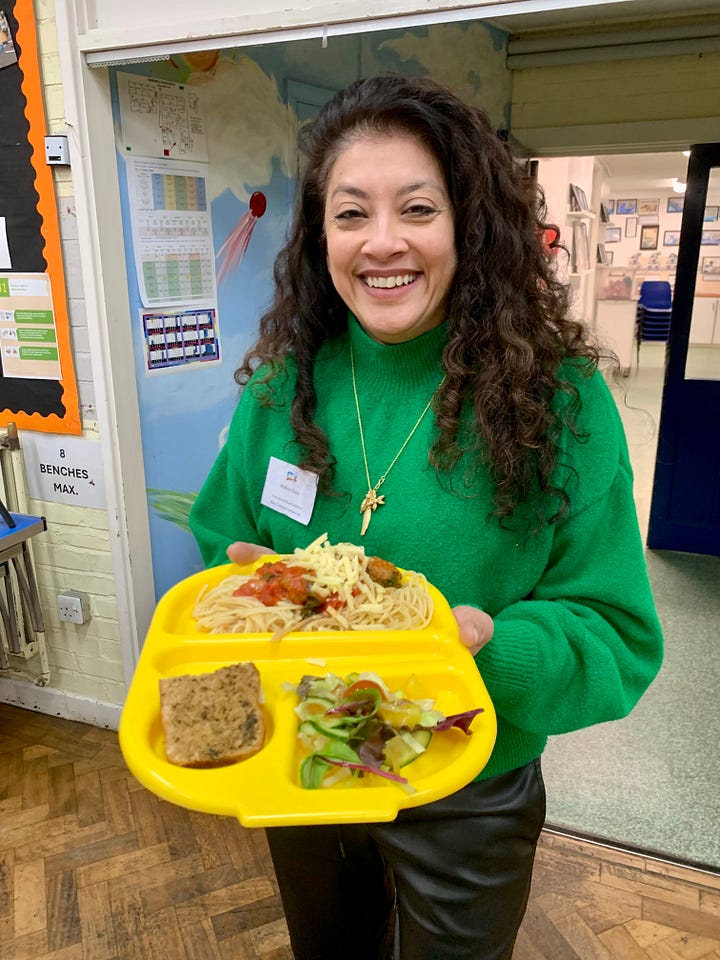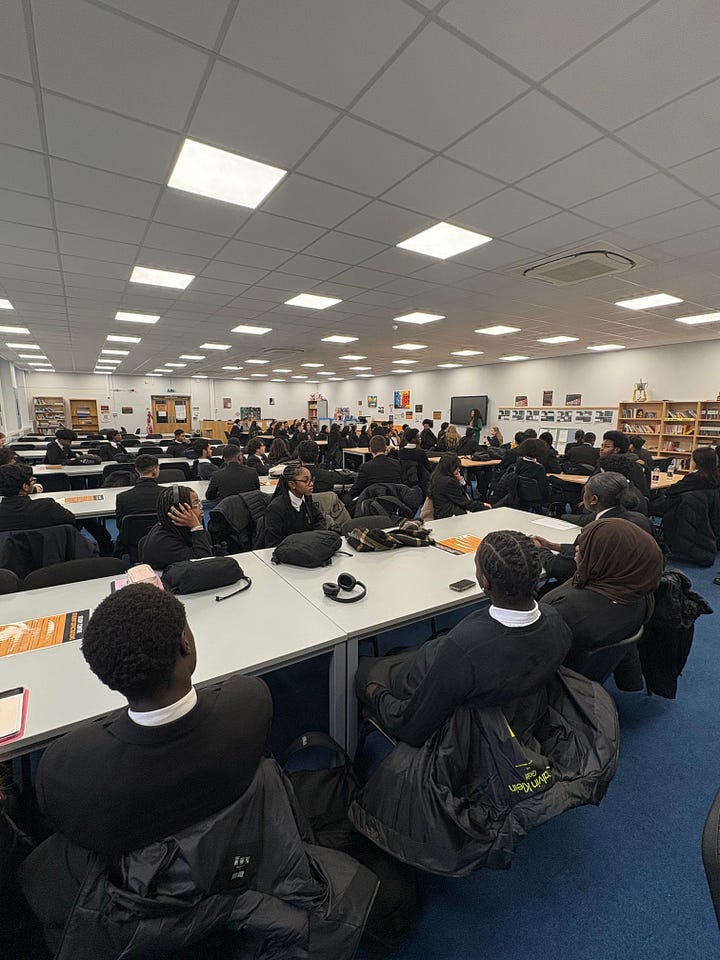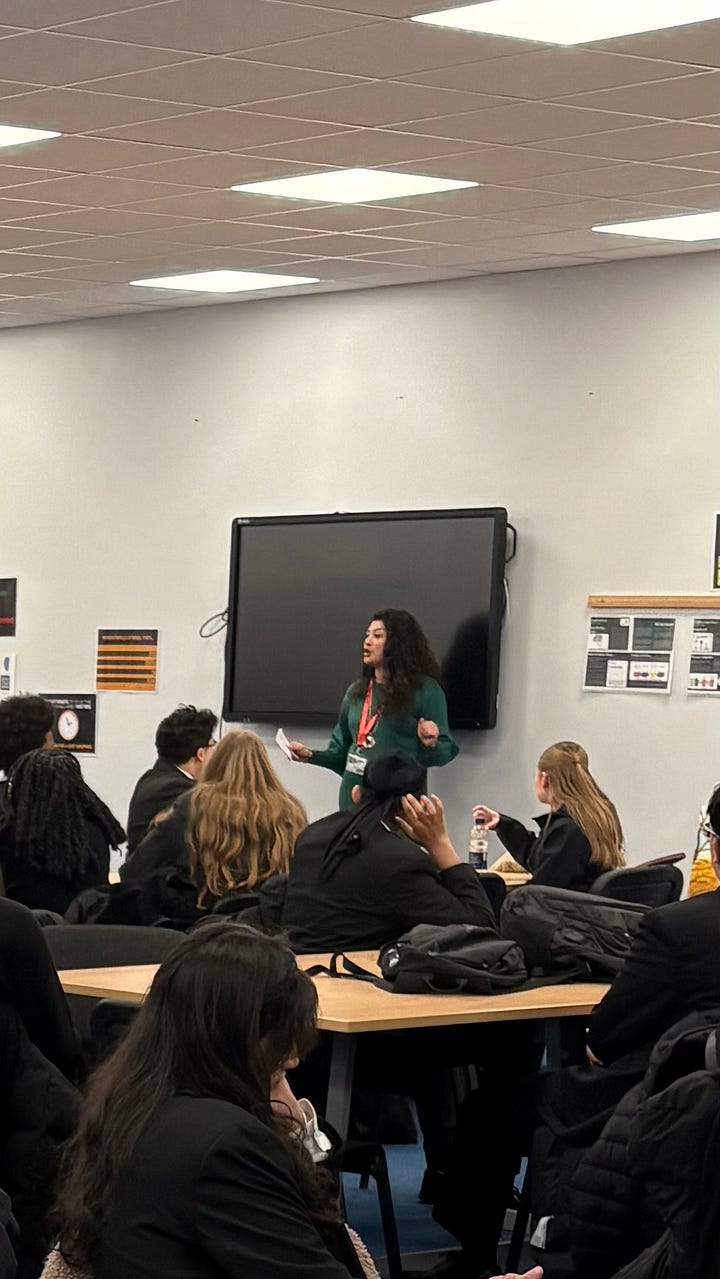Every cliche in the world will tell you that children are the future, the leaders of tomorrow and our most important investment. So I started the year getting stuck into what they eat or don’t, and what they make of careers in food, drink, hospitality, farming and agriculture. There were some revelations along the way I thought I’d share with you.
In the interest of what the corporates might call an “integrated, multi-pronged immersive experience” I also tried to engage my own in the kitchen with mixed success. Although the nine in one cooker I’ve acquired as a business investment seems to be smoking the teens out of their rooms (along with wi fi disconnection and fried bacon).




Pics: Top, School dinner event by Soil Association, bottom, Barking Abbey School
The thing about school dinners
First up, I travelled all the way to Oxford to attend the Soil Association’s School Dinners event. The twist here is that we would be eating an actual school dinner. I feared it may be worst meal I would eat all year and starting 2025 with it was ominous, to put it mildly. Turns out queuing for a plastic tray smothered with spaghetti meatballs by smiling dinner ladies, chased with warm crumble and custard was charming and wholesome.
The truth lurking in school dinners is less charming. I spoke to the headteacher of my children’s primary state school before I travelled up and I could feel his rage through the whatsapp messages. The budget for the average school meal is £2.53 and only 40% of that goes on ingredients. Apparently you can do a lot for that, but our children are eating a whole meal for less than what it costs to buy a coffee on the high street. Everyone at the event agreed that more funding is needed. But we’ve also lost the skills needed to cook, with dinner ladies mostly opening bags of frozen or partially cooked meals and serving them up.
My highlights of the evening were Derek Wright, catering services manager for Blackpool Council, a former chef who spoke passionately about the topic. All young people get free breakfast in Blackpool. There are pockets of great practice like theirs, which aren’t shared. Keynote speaker Professor Kevin Morgan has a new book out called “Good Food Revolution in Schools, Hospitals and Prisons”. He said commitment to this was the “litmus test of a government’s commitment to social justice and ecological integrity”, which I wrote down and have been thinking about ever since. If all our children could eat nutritious, wholesome meals at school for breakfast and lunch, we could have a solid start in life from at least one perspective.
Choosing to care about food-related careers
I couldn’t help noticing I was the only ethnically diverse face in the room at the school dinners event. This is par for course in many of the rooms I enter in the sector. But this doesn’t represent the food we eat or the population. One way to attract more young people to food-related careers is to show up and talk to them about it. So I accepted an invite to a 2.5 hour round trip journey to speak at outstanding state school Barking Abbey in East London, from food writer Urvashi Roe and her husband, headteacher Tony Roe.
If the prospect of being one of a kind in a room sounds daunting, I highly recommend addressing a group of over 100 17-year-olds. Only three had worked in the sector and mostly hated it. As it turns out, it was the best way to brighten up a dreary January afternoon. The young people, mostly of black, south Asian, East and South East Asian and mixed heritage, were so engaged I was blown away. And then came the flood of questions:
What subjects do you need to study to work in food?
How do you get published?
How important is it for men to cook? (Very, hello gender equity and essential life skills)
What are the most basic dishes everyone should learn?
(My answer: soup, tomato sauce, and stir-fry. One student was disappointed I didn’t say rice — but I did get a lot of fist pumps, finger clicking and applause when I shared that I dedicated my first cookbook to the boss who said I couldn't write!). The questions came so thick and fast that the Deputy Headteacher of character and aspiration Stephen Madigan had to step in to wrap things up. He also thanked me for coming because the students don’t get many speakers who look like them.
And that stuck with me. Representation matters. It’s encouraging, reassuring and motivating to see people like you in a room. But when you don’t see someone who looks like you in the place you want to be, that’s not a stop sign. It’s an invitation. So I told the group that: Walk tall. Be the first. And if you can’t be the first, be the best. I hope you agree with my advice here and that it inspires some career moves in that room.
What makes careers in agriculture so great
Because careers in food, farming and agriculture could really do with that interest. Agriculture is the least racially and ethnically diverse of all sectors in the UK. I’ve been supporting the National Farmer’s Union with AgriFuture, a long-term, hands on programme that engages diverse young people from city centres to careers in the sector. As part of this, I attended and delivered a keynote speech at their kick off day bringing together some 80 people.
There are huge problems with barriers to entry, belonging, recognition and celebration, which were covered in the keynote by the brilliant Navratnam Partheeban OBE who will also tell you that racism is rife. A Scottish Tamil (in his own admission), he’s been championing diversity in agriculture with initiatives and an AgDiversity course to improve learning and understanding. But this wasn’t my brief. I was asked to talk about what makes careers in agriculture so great.
I started by wondering aloud what if I told my parents I wanted to be a farmer? How would I react if my own teens chose a career in agriculture? And what about my wider family?
The truth is that many elders in our communities still see farming and agriculture as poverty, hardship, mud, muck and grime. The images and news headlines of the sector don’t help. And yet, farming is about running a business, that too in some of the toughest conditions known to people. The future of the sector goes hand in hand with technology - robotics, AI, sensors, data led decision making are all part of the future of farming. The sector needs fresh branding to sell the economic opportunity and STEM careers that are part of it.
If we ever needed a better reason to feel like we belong, we need to look at our plates. We enjoy the tastes, flavours and ingredients of so many different parts of the world in our daily meals. Many of us hailing from those communities have grown up with agriculture embedded into our food cultures, e.g. harvest festivals, traditions around what we eat and when. As our diets become more westernised and unhealthy, we’re losing some of our traditional wisom, foodways and cultural foods. Getting stuck in means reintroducing some of that generational knowledge and know how, creating fresh opportunities for generational wealth, future resilience and reflecting the diversity in the population it feeds.
It’s been a fulfilling start to the year, looking to the future while plotting my own. I hope you find the insights useful and look forward to hearing yours!





Thank you Mallika for this. The lack of healthy food for little ones, in hospitals and prisons is unbelievable, especially with all the facts about a healthy diet leading to better cognitive function, behaviour etc. related to our gut biome.
Interesting reading. But from someone who have work in the education catering for over twenty years. It’s concerning that no one mentions the true cost of school meals ? This is a sector that has been under funded for decades.